animal-farm
- 格式:docx
- 大小:21.73 KB
- 文档页数:4
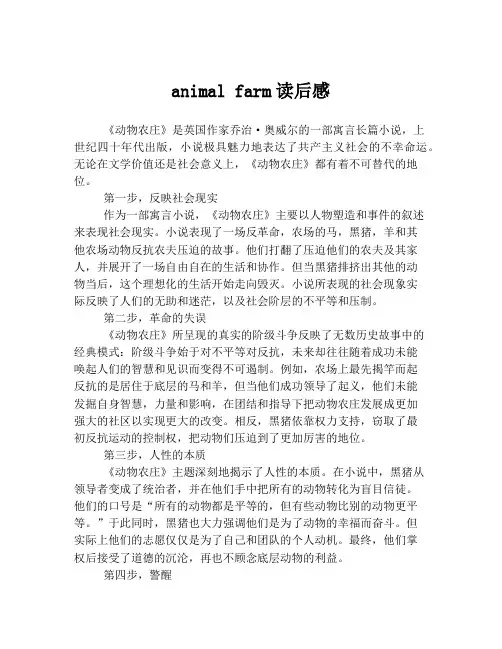
animal farm读后感《动物农庄》是英国作家乔治·奥威尔的一部寓言长篇小说,上世纪四十年代出版,小说极具魅力地表达了共产主义社会的不幸命运。
无论在文学价值还是社会意义上,《动物农庄》都有着不可替代的地位。
第一步,反映社会现实作为一部寓言小说,《动物农庄》主要以人物塑造和事件的叙述来表现社会现实。
小说表现了一场反革命,农场的马,黑猪,羊和其他农场动物反抗农夫压迫的故事。
他们打翻了压迫他们的农夫及其家人,并展开了一场自由自在的生活和协作。
但当黑猪排挤出其他的动物当后,这个理想化的生活开始走向毁灭。
小说所表现的社会现象实际反映了人们的无助和迷茫,以及社会阶层的不平等和压制。
第二步,革命的失误《动物农庄》所呈现的真实的阶级斗争反映了无数历史故事中的经典模式:阶级斗争始于对不平等对反抗,未来却往往随着成功未能唤起人们的智慧和见识而变得不可遏制。
例如,农场上最先揭竿而起反抗的是居住于底层的马和羊,但当他们成功领导了起义,他们未能发掘自身智慧,力量和影响,在团结和指导下把动物农庄发展成更加强大的社区以实现更大的改变。
相反,黑猪依靠权力支持,窃取了最初反抗运动的控制权,把动物们压迫到了更加厉害的地位。
第三步,人性的本质《动物农庄》主题深刻地揭示了人性的本质。
在小说中,黑猪从领导者变成了统治者,并在他们手中把所有的动物转化为盲目信徒。
他们的口号是“所有的动物都是平等的,但有些动物比别的动物更平等。
”于此同时,黑猪也大力强调他们是为了动物的幸福而奋斗。
但实际上他们的志愿仅仅是为了自己和团队的个人动机。
最终,他们掌权后接受了道德的沉沦,再也不顾念底层动物的利益。
第四步,警醒《动物农庄》深刻地反映了人类社会的历史,使我们感受到了不等的危害,不认知人性本质情势下的狠毒。
读完本书,深切理解到革命,是一个庞大的体系,需要智慧和领导。
我们的革命并不是一锤子的买卖,革命成功之后,更需要那些富有才华的治理者去维护国家政治和社会稳定,否则后果将会毁灭性的。
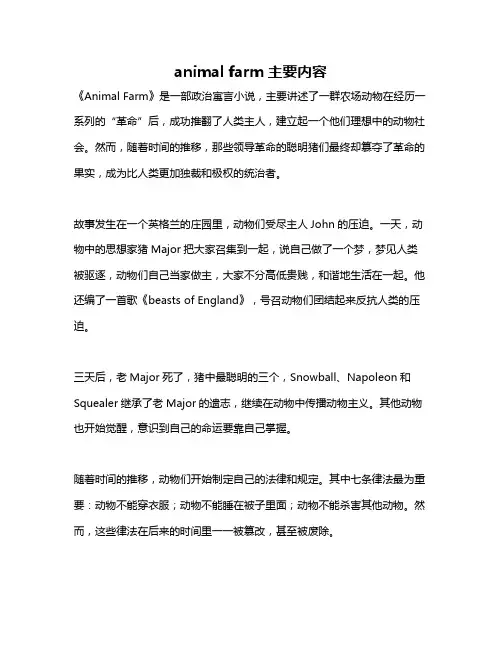
animal farm主要内容
《Animal Farm》是一部政治寓言小说,主要讲述了一群农场动物在经历一系列的“革命”后,成功推翻了人类主人,建立起一个他们理想中的动物社会。
然而,随着时间的推移,那些领导革命的聪明猪们最终却篡夺了革命的果实,成为比人类更加独裁和极权的统治者。
故事发生在一个英格兰的庄园里,动物们受尽主人John的压迫。
一天,动物中的思想家猪Major把大家召集到一起,说自己做了一个梦,梦见人类被驱逐,动物们自己当家做主,大家不分高低贵贱,和谐地生活在一起。
他还编了一首歌《beasts of England》,号召动物们团结起来反抗人类的压迫。
三天后,老Major死了,猪中最聪明的三个,Snowball、Napoleon和Squealer继承了老Major的遗志,继续在动物中传播动物主义。
其他动物也开始觉醒,意识到自己的命运要靠自己掌握。
随着时间的推移,动物们开始制定自己的法律和规定。
其中七条律法最为重要:动物不能穿衣服;动物不能睡在被子里面;动物不能杀害其他动物。
然而,这些律法在后来的时间里一一被篡改,甚至被废除。
最后,动物们的生活并没有变得更好,反而比以前更加糟糕。
而那些领导革命的猪们,则成为了比人类更加独裁和极权的统治者。
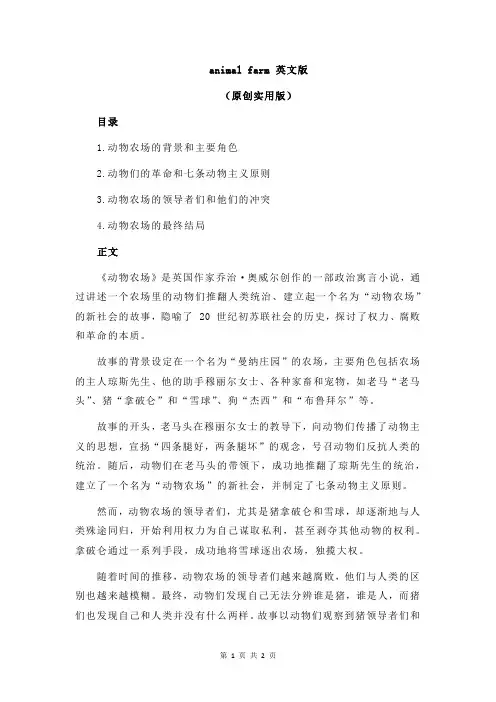
animal farm 英文版
(原创实用版)
目录
1.动物农场的背景和主要角色
2.动物们的革命和七条动物主义原则
3.动物农场的领导者们和他们的冲突
4.动物农场的最终结局
正文
《动物农场》是英国作家乔治·奥威尔创作的一部政治寓言小说,通过讲述一个农场里的动物们推翻人类统治、建立起一个名为“动物农场”的新社会的故事,隐喻了 20 世纪初苏联社会的历史,探讨了权力、腐败和革命的本质。
故事的背景设定在一个名为“曼纳庄园”的农场,主要角色包括农场的主人琼斯先生、他的助手穆丽尔女士、各种家畜和宠物,如老马“老马头”、猪“拿破仑”和“雪球”、狗“杰西”和“布鲁拜尔”等。
故事的开头,老马头在穆丽尔女士的教导下,向动物们传播了动物主义的思想,宣扬“四条腿好,两条腿坏”的观念,号召动物们反抗人类的统治。
随后,动物们在老马头的带领下,成功地推翻了琼斯先生的统治,建立了一个名为“动物农场”的新社会,并制定了七条动物主义原则。
然而,动物农场的领导者们,尤其是猪拿破仑和雪球,却逐渐地与人类殊途同归,开始利用权力为自己谋取私利,甚至剥夺其他动物的权利。
拿破仑通过一系列手段,成功地将雪球逐出农场,独揽大权。
随着时间的推移,动物农场的领导者们越来越腐败,他们与人类的区别也越来越模糊。
最终,动物们发现自己无法分辨谁是猪,谁是人,而猪们也发现自己和人类并没有什么两样。
故事以动物们观察到猪领导者们和
人类在农场主楼里举行宴会,发现他们竟然在跳舞,而原本的动物主义原则早已被遗忘,从而结束。
《动物农场》通过一个充满讽刺和隐喻的故事,揭示了权力和腐败的本质,以及革命的理想和现实之间的巨大差距。
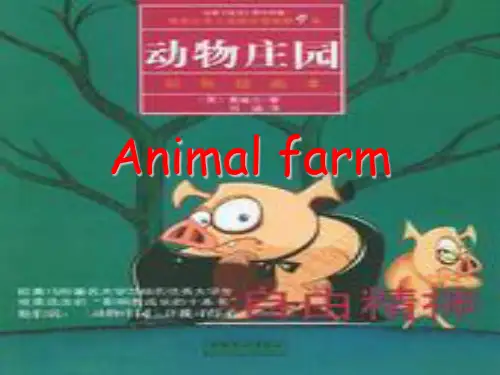
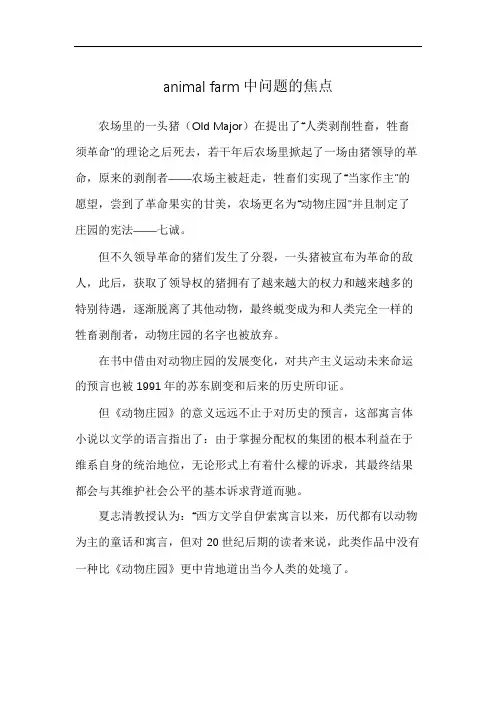
animal farm中问题的焦点
农场里的一头猪(Old Major)在提出了“人类剥削牲畜,牲畜须革命”的理论之后死去,若干年后农场里掀起了一场由猪领导的革命,原来的剥削者——农场主被赶走,牲畜们实现了“当家作主”的愿望,尝到了革命果实的甘美,农场更名为“动物庄园”并且制定了庄园的宪法——七诚。
但不久领导革命的猪们发生了分裂,一头猪被宣布为革命的敌人,此后,获取了领导权的猪拥有了越来越大的权力和越来越多的特别待遇,逐渐脱离了其他动物,最终蜕变成为和人类完全一样的牲畜剥削者,动物庄园的名字也被放弃。
在书中借由对动物庄园的发展变化,对共产主义运动未来命运的预言也被1991年的苏东剧变和后来的历史所印证。
但《动物庄园》的意义远远不止于对历史的预言,这部寓言体小说以文学的语言指出了:由于掌握分配权的集团的根本利益在于维系自身的统治地位,无论形式上有着什么檬的诉求,其最终结果都会与其维护社会公平的基本诉求背道而驰。
夏志清教授认为:“西方文学自伊索寓言以来,历代都有以动物为主的童话和寓言,但对20世纪后期的读者来说,此类作品中没有一种比《动物庄园》更中肯地道出当今人类的处境了。
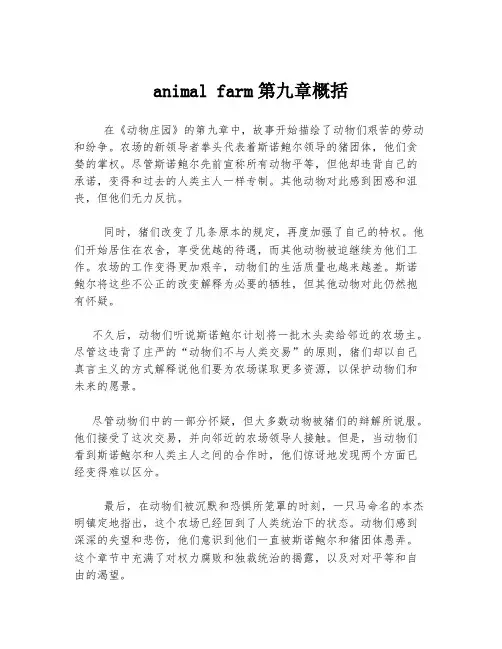
animal farm第九章概括
在《动物庄园》的第九章中,故事开始描绘了动物们艰苦的劳动和纷争。
农场的新领导者拳头代表着斯诺鲍尔领导的猪团体,他们贪婪的掌权。
尽管斯诺鲍尔先前宣称所有动物平等,但他却违背自己的承诺,变得和过去的人类主人一样专制。
其他动物对此感到困惑和沮丧,但他们无力反抗。
同时,猪们改变了几条原本的规定,再度加强了自己的特权。
他们开始居住在农舍,享受优越的待遇,而其他动物被迫继续为他们工作。
农场的工作变得更加艰辛,动物们的生活质量也越来越差。
斯诺鲍尔将这些不公正的改变解释为必要的牺牲,但其他动物对此仍然抱有怀疑。
不久后,动物们听说斯诺鲍尔计划将一批木头卖给邻近的农场主。
尽管这违背了庄严的“动物们不与人类交易”的原则,猪们却以自己真言主义的方式解释说他们要为农场谋取更多资源,以保护动物们和未来的愿景。
尽管动物们中的一部分怀疑,但大多数动物被猪们的辩解所说服。
他们接受了这次交易,并向邻近的农场领导人接触。
但是,当动物们看到斯诺鲍尔和人类主人之间的合作时,他们惊讶地发现两个方面已经变得难以区分。
最后,在动物们被沉默和恐惧所笼罩的时刻,一只马命名的本杰明镇定地指出,这个农场已经回到了人类统治下的状态。
动物们感到深深的失望和悲伤,他们意识到他们一直被斯诺鲍尔和猪团体愚弄。
这个章节中充满了对权力腐败和独裁统治的揭露,以及对对平等和自由的渴望。
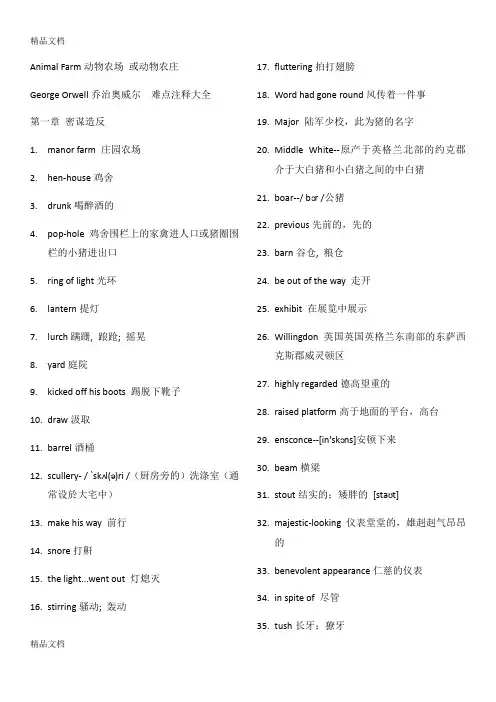
Animal Farm动物农场或动物农庄George Orwell乔治奥威尔难点注释大全第一章密谋造反1.manor farm 庄园农场2.hen-house鸡舍3.drunk喝醉酒的4.pop-hole鸡舍围栏上的家禽进人口或猪圈围栏的小猪进出口5.ring of light光环ntern提灯7.lurch蹒跚, 踉跄; 摇晃8.yard庭院9.kicked off his boots 踢脱下靴子10.draw汲取11.barrel酒桶12.scullery- / `skʌl(ə)ri /(厨房旁的)洗涤室(通常设於大宅中)13.make his way 前行14.snore打鼾15.the light...went out 灯熄灭16.stirring骚动; 轰动17.fluttering拍打翅膀18.Word had gone round风传着一件事19.Major 陆军少校,此为猪的名字20.Middle White--原产于英格兰北部的约克郡介于大白猪和小白猪之间的中白猪21.boar--/ bɔr /公猪22.previous先前的,先的23.barn谷仓, 粮仓24.be out of the way 走开25.exhibit 在展览中展示26.Willingdon英国英国英格兰东南部的东萨西克斯郡威灵顿区27.highly regarded德高望重的28.raised platform高于地面的平台,高台29.ensconce--[in'skɔns]安顿下来30.beam横梁31.stout结实的;矮胖的[staʊt]32.majestic-looking仪表堂堂的,雄赳赳气昂昂的33.benevolent appearance仁慈的仪表34.in spite of 尽管35.tush长牙;獠牙36.Before long不久,很快37.after their different fashions按各自不同的方式38.settle down安顿下来39.perch栖息40.window-sill窗台41.flutter拍打翅膀42.rafter 椽,承屋瓦的圆木y down --动词原形lie down躺下休息44.chew the cud反刍,fǎnchú45.偶蹄类的某些动物把粗粗咀嚼后咽下去的食物再反回到嘴里细细咀嚼,然后再咽下。
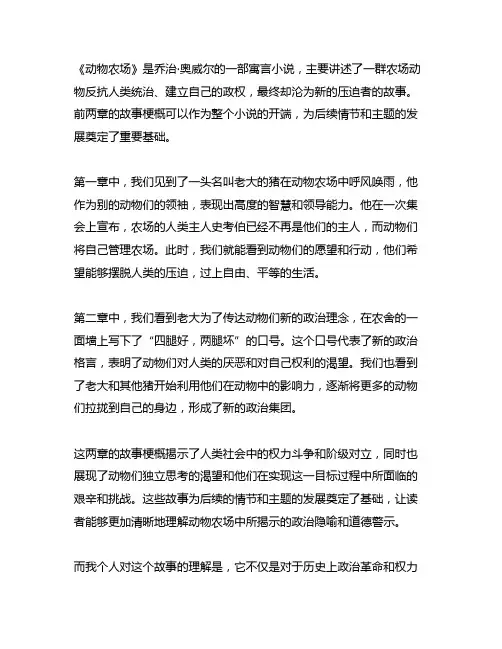
《动物农场》是乔治·奥威尔的一部寓言小说,主要讲述了一群农场动物反抗人类统治、建立自己的政权,最终却沦为新的压迫者的故事。
前两章的故事梗概可以作为整个小说的开端,为后续情节和主题的发展奠定了重要基础。
第一章中,我们见到了一头名叫老大的猪在动物农场中呼风唤雨,他作为别的动物们的领袖,表现出高度的智慧和领导能力。
他在一次集会上宣布,农场的人类主人史考伯已经不再是他们的主人,而动物们将自己管理农场。
此时,我们就能看到动物们的愿望和行动,他们希望能够摆脱人类的压迫,过上自由、平等的生活。
第二章中,我们看到老大为了传达动物们新的政治理念,在农舍的一面墙上写下了“四腿好,两腿坏”的口号。
这个口号代表了新的政治格言,表明了动物们对人类的厌恶和对自己权利的渴望。
我们也看到了老大和其他猪开始利用他们在动物中的影响力,逐渐将更多的动物们拉拢到自己的身边,形成了新的政治集团。
这两章的故事梗概揭示了人类社会中的权力斗争和阶级对立,同时也展现了动物们独立思考的渴望和他们在实现这一目标过程中所面临的艰辛和挑战。
这些故事为后续的情节和主题的发展奠定了基础,让读者能够更加清晰地理解动物农场中所揭示的政治隐喻和道德警示。
而我个人对这个故事的理解是,它不仅是对于历史上政治革命和权力斗争的一种寓言性揭示,更是对于人类社会中普遍存在的欲望与利益、道德与权力的错综复杂关系的一种深刻思考。
希望读者能够通过阅读这篇文章,更深入地理解《动物农场》这部经典作品所蕴含的丰富内涵。
愿这篇文章对你有所帮助。
在农场动物们建立新政权的初期,他们为了摆脱人类的压迫而团结在一起,希望能够过上自由、平等的生活。
他们相信老大,相信他的领导能力和智慧,全心全意地跟随着他,为了共同的目标努力着。
在农场中,动物们开始建立起新的秩序和规则,他们自发地组织起来,共同管理着农场的生产和生活。
他们设计了一套新的工作制度和分配制度,让每一只动物都能够参与到农场的建设和发展中来,共同共享劳动成果。
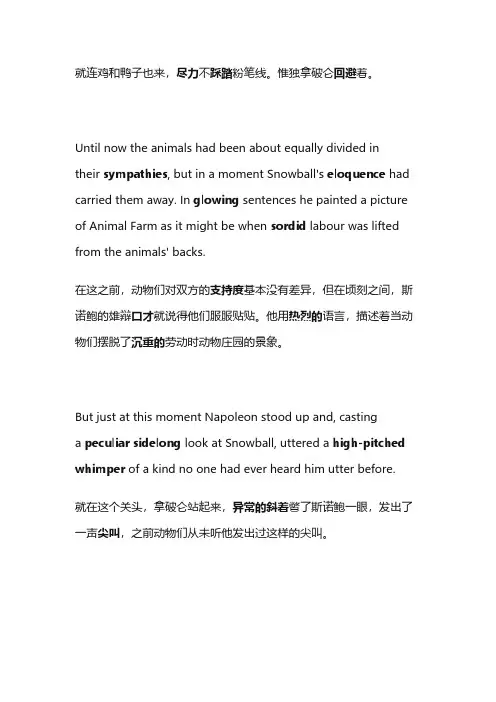
Animal Farm (《动物农场》) 摘抄Chapter 1At the last moment Mollie, the foolish, pretty white marewho drew Mr. Jones's trap, came mincing daintily in, chewing at a lump of sugar.莫丽来得很晚,这个愚蠢的家伙,长着一身白生生的毛,拉琼斯先生的双轮轻便车。
她扭扭捏捏地走进来,一颠一颠地,嘴里还嚼着一块糖。
Last of all came the cat, who looked round, as usual, for the warmest place, and finally squeezed herself in between Boxer and Clover.猫是最后一个来的,她象往常一样,到处寻找最热乎的地方,最后在鲍克瑟和克拉弗当中挤了进去。
The cows lowed it, the dogs whined it, the sheep bleated it, the horses whinnied it, the ducks quacked it.牛哞哞地叫,狗汪汪地吠,羊咩咩地喊,马嘶嘶地鸣,鸭子嘎嘎地唤。
Chapter 2Snowball was a more vivacious pig than Napoleon, quicker in speech and more inventive, but was not considered to have the same depth of character.相比之下,斯诺鲍要活跃多了,口才好,也更有独创性,但看起来个性上没有拿破仑那么深沉。
They had never seen animals behave like this before, and this sudden uprising of creatures whom they were usedto thrashing and maltreating just as they chose, frightened them almost out of their wits.他们从前还没有见到动物这样的举动,他们曾经是怎样随心所欲的鞭笞和虐待这一群畜牲!而这群畜牲们的突然暴动吓得他们魂飞魄散。
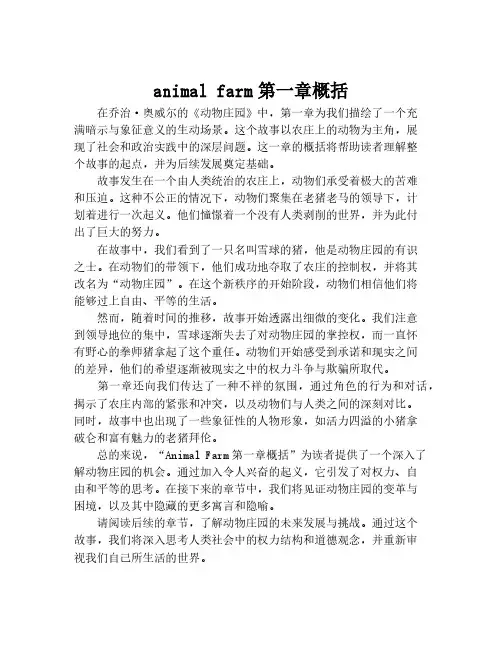
animal farm第一章概括在乔治·奥威尔的《动物庄园》中,第一章为我们描绘了一个充满暗示与象征意义的生动场景。
这个故事以农庄上的动物为主角,展现了社会和政治实践中的深层问题。
这一章的概括将帮助读者理解整个故事的起点,并为后续发展奠定基础。
故事发生在一个由人类统治的农庄上,动物们承受着极大的苦难和压迫。
这种不公正的情况下,动物们聚集在老猪老马的领导下,计划着进行一次起义。
他们憧憬着一个没有人类剥削的世界,并为此付出了巨大的努力。
在故事中,我们看到了一只名叫雪球的猪,他是动物庄园的有识之士。
在动物们的带领下,他们成功地夺取了农庄的控制权,并将其改名为“动物庄园”。
在这个新秩序的开始阶段,动物们相信他们将能够过上自由、平等的生活。
然而,随着时间的推移,故事开始透露出细微的变化。
我们注意到领导地位的集中,雪球逐渐失去了对动物庄园的掌控权,而一直怀有野心的拳师猪拿起了这个重任。
动物们开始感受到承诺和现实之间的差异,他们的希望逐渐被现实之中的权力斗争与欺骗所取代。
第一章还向我们传达了一种不祥的氛围,通过角色的行为和对话,揭示了农庄内部的紧张和冲突,以及动物们与人类之间的深刻对比。
同时,故事中也出现了一些象征性的人物形象,如活力四溢的小猪拿破仑和富有魅力的老猪拜伦。
总的来说,“Animal Farm第一章概括”为读者提供了一个深入了解动物庄园的机会。
通过加入令人兴奋的起义,它引发了对权力、自由和平等的思考。
在接下来的章节中,我们将见证动物庄园的变革与困境,以及其中隐藏的更多寓言和隐喻。
请阅读后续的章节,了解动物庄园的未来发展与挑战。
通过这个故事,我们将深入思考人类社会中的权力结构和道德观念,并重新审视我们自己所生活的世界。
绝对不使用“首先”、“其次”、“最后”和“总的来说”这样的逻辑词语,保持文章流畅、生动,让读者更加投入其中。
同时,注意在整篇文章中贯穿主题,避免无关杂乱的内容,确保文档质量的综合性提高。
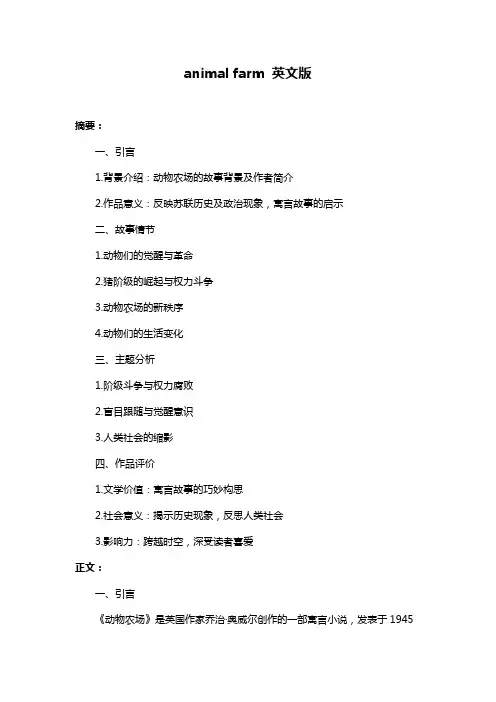
animal farm 英文版摘要:一、引言1.背景介绍:动物农场的故事背景及作者简介2.作品意义:反映苏联历史及政治现象,寓言故事的启示二、故事情节1.动物们的觉醒与革命2.猪阶级的崛起与权力斗争3.动物农场的新秩序4.动物们的生活变化三、主题分析1.阶级斗争与权力腐败2.盲目跟随与觉醒意识3.人类社会的缩影四、作品评价1.文学价值:寓言故事的巧妙构思2.社会意义:揭示历史现象,反思人类社会3.影响力:跨越时空,深受读者喜爱正文:一、引言《动物农场》是英国作家乔治·奥威尔创作的一部寓言小说,发表于1945年。
作品以苏联历史为背景,通过讲述一群动物在农场里的革命斗争和权力斗争,揭示了二十世纪苏联政治现象,同时也为读者呈现了一幅生动的政治讽刺画卷。
二、故事情节1.动物们的觉醒与革命:故事开始于农场里的动物们受到压迫,它们在猪头领者老马的带领下,觉醒过来,发起了革命,推翻了人类的统治。
2.猪阶级的崛起与权力斗争:革命成功后,猪阶级逐渐崛起,开始掌握农场的大权。
其中,拿破仑和雪球两派别展开了一场激烈的权力斗争。
3.动物农场的新秩序:拿破仑战胜雪球后,农场进入了新秩序。
猪阶级逐渐变得腐败,开始与人类勾结,剥削其他动物。
4.动物们的生活变化:在猪阶级的统治下,动物们的生活并没有得到改善,反而越来越糟糕。
它们逐渐意识到,革命的目标并没有实现。
三、主题分析1.阶级斗争与权力腐败:作品通过动物农场里的权力斗争,反映了现实社会中的阶级斗争。
当权力落到腐败分子手中,社会矛盾愈发尖锐。
2.盲目跟随与觉醒意识:作品中的动物们起初盲目跟随猪阶级,后来逐渐觉醒,意识到革命的初衷并未实现。
这种觉醒意识对于动物们来说,是摆脱压迫的关键。
3.人类社会的缩影:动物农场的故事实际上是人类社会的缩影。
作者通过讽刺的手法,揭示了权力斗争的残酷性和阶级压迫的实质。
四、作品评价1.文学价值:乔治·奥威尔巧妙地运用寓言故事的形式,表达了对现实社会的批判。
animal farm写作手法George Orwell的小说《动物农场》是一部讽刺寓言作品,通过描绘一个动物社会的发展过程,呈现出了一系列独特的写作手法,使读者深受启发。
在本文中,将介绍《动物农场》中的几个重要写作手法,包括象征主义、对比、夸张和反讽等。
首先,象征主义是《动物农场》的核心写作手法之一。
作者通过将动物代表不同的社会集团和政治力量,隐喻着人类社会中的各种现象。
例如,《动物农场》中的猪代表了精英阶层,马代表了劳动阶级,这些象征性的角色与现实生活中的人物相对应,让读者更好地理解故事所揭示的政治现象。
其次,对比是另一个不可忽视的写作手法。
作者通过对比动物农场建立初期的理想社会和最终堕落成专制社会的描绘,强调了社会制度的崩溃和权力的腐败。
这种对比不仅突出了动物农场社会的巨大变化,还使读者更加深入地思考现实社会中的权力和腐败问题。
夸张是《动物农场》中的又一重要写作手法。
通过夸张手法,作者放大了动物的特征和行为,以达到揭示社会问题的目的。
例如,书中描述的肥胖的猪拿着鞭子,指挥其他动物劳作,这种夸张的形象使读者对动物的统治感到愤慨,同时也对人类社会中的专制统治进行了嘲讽。
反讽也贯穿于整个小说中。
在《动物农场》中,动物为了摆脱人类的压迫而建立农场,但最终他们自己成为了新的压迫者。
这种反讽手法让读者深刻认识到权力的滥用和革命的失败,引发了对社会和政治问题的思考。
总结而言,《动物农场》通过运用象征主义、对比、夸张和反讽等多种写作手法,生动地揭示了社会和政治问题。
这些手法使小说更富有表现力,引发读者的思考和共鸣。
以《动物农场》为例,读者不仅可以享受故事本身带来的阅读乐趣,更可以通过揣摩作者的写作手法,拓展自己的文学视野和写作技巧。
以上就是《动物农场写作手法》的内容介绍。
通过掌握这些写作手法,读者不仅可以更好地理解《动物农场》,还可以在自己的写作中运用这些手法,使作品更具有表现力和影响力。
希望本文能帮助读者更好地理解和欣赏这部伟大的作品。
animal farm主要内容
《动物庄园》是乔治·奥威尔的一部寓言小说,通过对农庄动物起义和建立自己社会的描写,暗示了人类社会的政治现实。
这个故事以一个农庄为背景,揭示了权力和腐败的本质,以及人性的弱点。
农庄动物们决定起义,推翻了人类的统治。
他们建立了一个理想的社会,每个动物都平等地参与决策和劳动,按需分配资源。
最初,动物们热情高涨,充满了希望和憧憬。
然而,很快一些动物开始崛起,夺取了更多的权力。
最有权势的是猪,他们利用智慧和言辞的娴熟,逐渐掌控了庄园的一切。
他们制定了一套自己的法律和规则,以维护自己的特权。
随着时间的推移,庄园的情况开始变得糟糕。
动物们的生活并没有变得更好,反而变得更糟。
猪们剥夺了其他动物的权益,用虚假的宣传和恐吓来控制他们。
他们篡改了历史,通过宣传来符合自己的利益。
动物们开始感到困惑和绝望。
最终,动物们发现,他们自己所建立的社会并没有摆脱人类社会的弊端。
猪们变得和人类一样,甚至更糟。
他们背叛了最初的理想,成为了压迫者和剥削者。
这个故事向读者们展示了权力的腐败和人性的弱点。
它警示我们,即使是最美好的愿望和最理想的社会,也会被权力的诱惑腐败。
《动物庄园》以其生动的描写和独特的寓言形式,给人们带来了深刻的
启示。
通过这个故事,我们可以思考现实社会中的政治和社会问题。
我们应该保持警惕,不被权力的诱惑所蒙蔽。
我们应该坚守自己的理想和原则,不让权力腐败玷污我们的心灵。
只有通过团结和努力,我们才能创造一个真正公正和平等的社会。
animal farm(动物农场)读后感
《动物农场》是英国作家乔治·奥威尔所写的一部寓言小说。
小说通过一群农场动物的故事,揭示出人类社会中的贪欲、命运、革命和背叛等丑恶的一面。
小说以幽默、又讽刺的手法揭示出了人类的缺陷,让读者们明白人性的复杂和真实的现实。
小说讲述了一个农场的故事,所有的动物们为了追求自己的权利和利益,一起发动了革命推翻了人类的统治。
为了顺利地推行革命,动物们制定了一套道德和行为准则——动物主义七项原则。
可是,在革命取得成功后,动物们的领袖猪拿破仑渐渐地变得专横,对其他动物进行了煽动和裹胁,最终令到动物们的生活变得比原来更加艰苦。
就像小说中最为充满喜感的场景之一,领袖猪宣布动物们充实精神文化生活的时候,为了不让他们产生“危险的思想”,强行禁止了玩纸牌这种不好的游戏。
这段描写讽刺了领袖猪不愿动物们变聪明,同时也暗示了他对自己权利和利益的执着以及对其他人民的不负责任。
另一个值得关注的是,小说中出现的的动物个体性格给读者留下了深刻的印象。
其中像领袖猪拿破仑这样的角色,他的出现表示着人性的贪婪和狡猾。
虽然他原本是唱着与领袖猪雪球不同的主张,但一旦掌握了权利,他就转变了自己的立场。
过多刻画带给读者灵感同时,也为故事的深层含义增添了色彩。
在读完这部小说之后,我更加意识到了人性的复杂和社会现实的残酷。
奥威尔通过动物们的故事,让我们看到了人类社会中的漆黑面,也让我们更加好奇于这一原本陌生而又深奥的世界。
在我看来,《动物农场》是人生的最佳读物之一,它以一种独特的方式向读者展现了人性深处不为人知的暗角,呼唤我们尽早为梦想而努力奋斗。
《动物庄园》(Animal Farm)1000字读后感《动物庄园》是乔治·奥威尔的一部政治寓言,通过一群庄园动物反抗人类压迫的故事,深刻地探讨了权力、腐败和社会变革的主题。
阅读这部小说,我感受到了奥威尔对于人性弱点和政治体制的深刻洞察,以及对社会现象的犀利批判。
故事以庄园动物反抗人类的压迫为起点,通过反映动物们最初的理想追求和反抗过程,揭示了权力是如何腐化和变质的。
最初的反抗是为了摆脱人类的剥削和追求平等,但随着时间推移,领导层的动物也沉溺于权力之中,庄园动物的生活并没有变得更好,反而更为恶劣。
这使我深思,权力是如何使人变得腐化,即使最初的动机是正义和平等。
小说中的“所有动物平等,但有些动物比其他动物更平等”这一口号,生动地反映了权力下的虚伪。
领导层的动物们变得比人类更加残酷和专横,动物庄园逐渐演变成了新的统治体制。
这让我对于革命和权力交替的过程有了更为深刻的认识,领导者如何在权谋中背离最初的理想。
奥威尔通过对历史篡改和言论控制的描绘,揭示了权力如何通过改写历史来控制人们的思想。
动物庄园的领导层不仅篡改历史,还通过控制言论来操纵动物们的认知。
这让我深感对于真相和信息的掌控对于维持权力的稳定具有关键性的作用,也引发了我对于言论自由和信息透明的珍视。
小说中的动物形象鲜明地代表了社会不同阶层,使得寓言更具有广泛的普适性。
庄园动物不仅仅是对苏联政治的讽刺,更是对于权力的深刻思考。
通过动物们的命运,奥威尔向读者提出了一系列深刻的问题,引导我们思考社会政治现象的复杂性。
在阅读的过程中,我深感奥威尔对于政治和社会机制的敏锐观察。
通过简单而有力的寓言,他揭示了权力的危机和社会变革的曲折。
小说并不只是对历史的反思,更是对人性、权力和社会制度的深刻剖析。
《动物庄园》不仅在政治层面提出了深刻的问题,也在道德层面引发了读者的思考。
通过动物们的遭遇,我们得以窥见人类社会的弊病,思考权力如何在不同历史阶段展现其复杂的本质。
animal farm主要内容《动物农场》是乔治·奥威尔创作的一部寓言小说,以动物为主角,通过对动物农场的描述,揭示了人类社会中的权力斗争和社会不公。
故事发生在一座名叫庄园的农场上,动物在猪老大拿破仑的领导下推翻了人类的统治,建立了一个自给自足的社群。
故事一开始,农场的动物们受到人类的压迫和剥削,他们决定联合起来,推翻人类的统治,建立一个公平自由的社会。
他们制定了七条戒律,号称“四条腿好,两条腿坏”,并以此作为庄园的基本原则。
然而,随着时间的推移,动物们逐渐发现,原本美好的理想并没有实现。
最初的领袖猪老大雪球被他的兄弟拿破仑篡夺了权力,开始专制统治。
拿破仑利用自己的聪明才智和权谋手段,逐渐剥夺了其他动物的权益,将他们变成奴隶。
在动物农场中,猪被描绘为聪明而狡猾的动物,他们利用自己的智慧和权力来操控其他动物。
其他动物则代表了不同的社会阶层,如马匹代表了工人阶级,羊代表了盲从的民众。
通过这种方式,奥威尔生动地描绘了社会中的不同角色和他们之间的关系。
在这个农场中,农场的规则逐渐被改变,戒律被篡改,动物们逐渐失去了自己的权益和自由。
拿破仑和他的追随者利用恐惧和暴力来控制其他动物,使他们无法反抗。
最终,动物们发现,他们的生活并没有比在人类统治下更好,他们只是换了一个压迫者而已。
通过《动物农场》,奥威尔揭示了权力的腐败和社会的不公,警示人们要警惕权力的滥用。
这个故事告诉我们,为了实现真正的平等和自由,我们不能仅仅依靠一个人或者一个团体的领导,而是需要每个人的参与和关注。
《动物农场》以其深刻的寓意和生动的描写,引起了读者的共鸣。
它不仅是一部反映现实社会问题的文学作品,更是一部引人思考的哲学著作。
通过动物的视角,奥威尔向我们展示了权力的腐败和社会的不公,引发了读者对社会现象的思考和反思。
总的来说,《动物农场》是一部富有情感和深意的作品,通过对动物农场的描写,揭示了人类社会中的权力斗争和社会不公。
它提醒我们警惕权力的滥用,并呼吁每个人为实现真正的平等和自由而努力。
Short Work in Depth: Animal FarmBy Shi XinyingGeorge Orwell’s Animal Farm, one of his most prestigious masterpieces, is short in length but profound in depth. In only about thirty thousand words, the author depicts an allusive story in which a group of animals expulsed the farmer and then managed the farm on their own.In the beginning of the novel, the farm was supervised by Mr. Jones and the animals lived miserably like slaves. The night when the respectable boar old Major delivered a speech became the turning point. He appealed the animals to rebel against Jones. Though he did not live to witness the success of the revolution, two other pigs, Snowball and Napoleon, succeeded in expelling Jones and exercised full sovereignty over the farm. As an achievement of the rebellion, the seven commandments, reduced from old Mayor’s Animalism, formed ―an unalterable law by which all the animals on Animal Farm must live for ever after‖ (Orwell, 1983, p.22). However, the pigs gradually obtained the dominance over the whole farm as the most literate and intelligent animals. In the late chapters appeared internal controversies between the leaders, heavier working burden and poorer living conditions for animals except pigs, and even killings that should have been abandoned from this independent beasts’pasture. Few realized that they were deceived and exploited by pigs, the new privileged stratum. None dared to revolt or simply complain: if they do so, they will be murdered. Finally, law and order was changed and the farm virtually returned to what it had been.Orwell’s language is simple. He rarely uses hard vocabulary that even a kindergarten child can read his tale. But a kid can never understand the implications of his words. According to Orwell’s own saying, the book was the first he tried ―to fuse political purpose and artistic purpose into one whole‖ (Orwell, 1956, p.395). It is obvious that the fiction is mainly an animal version of Russian Revolution. In the aspect of the characters, for instance, the dead old Mayor who firstly raised the ideology of Animalism represents Lenin; Snowball, the scholarly ex-leader who was slandered enemy of all animals, shares a similar experience of injustice with banished Russian revolutionist Trotsky; dictator Napoleon stands for Stalin with no doubt; other animals, though still different in details, symbolize the majority of Russian civilians. Moreover, evidences can be found almost everywhere in the plots. The abolishment of the song ―Beasts of England‖ resembles the original Russian national anthem ―Internationale‖; the green banner with hoof and horn came from Soviet national flag with hammer and sickle; their neighbour Pinchfield Farm’s deception and attack suggests the Molotov–Ribbentrop Pact between Bolshevik and Nazi; the building of the windmill s the New Economy Policy and etc.Nevertheless, it is unfair to regard this story merely as ―a rollicking caricature of the Russian Revolution‖ (Meyers, 1975, p.198). Some paragraphs also remind readers of history in western society. ―Long live Napoleon‖ is in the identical structure with ―long live the king‖ and ―long live Hitler‖. The last commandment ―all animals are equal‖, which is in the end added ―but some animals are more equal than others‖ can either be an irony on the Declaration of Independence in this way: all men are createdequal, but white men are more equal than other men and women. Orwell himself also said that his purpose was ―directly or indirectly against totalitarianism and for democratic socialism‖ (Orwell, 1956, p.394). Therefore, it is totally wrong to take Animal Farm as a criticism towards Soviet or Socialism. In fact, it is ―more meaningfully an anatomy of all political revolutions‖ (Lee, 1969, p.109). The author never sticks his writing to limited region or social system. Sarcastically, the beast fable became a vivid portrayal of the future world politics to some extent. Perhaps that is why Orwell is crowned ―wintry conscience of a generation‖ (Meyers, 1975, p.34).Master as he is, Orwell still leaves some small regrets in the book—namely the lack of a resolution to the problem. Until the finale of the fiction the obedient animals still altered nothing. The creatures were only able to stand beside, looking ―from pig to man, and from man to pig, and from pig to man again: but already it was impossibleto say which was which‖ (Orwell, 1983, p.122).However, the little pity cannot hinder Animal Farm from being one of the most significant literatures in twentieth century. Generally, it is worth reading and chewing, better together with Orwell’s Nineteen Eighty-four. Only do everyone learn by heart―how revolutionary ideals of justice, equality and fraternity always shatter in the event‖(Lee, 1969, p.109) will the future be bright for common civilians.References1.Lee, Robert A. (1969). Orwell’s Fiction. London: University of Notre DamePress.2.Meyers, Jeffrey. (Ed.)(1975). George Orwell. London and Boston: Routledge& Kegan Paul.3.Orwell, George. (1983). Animal Farm. Penguin Books in Association withMartin Secker & Warburg.4.Orwell, George. (1956). The Orwell Reader: Fiction, Essays, and Reportagewith an introduction by Richard H. Rovere. New York: Harcourt, Brace and Company.。